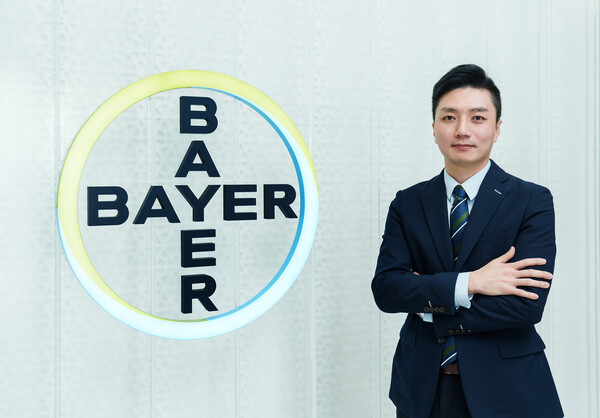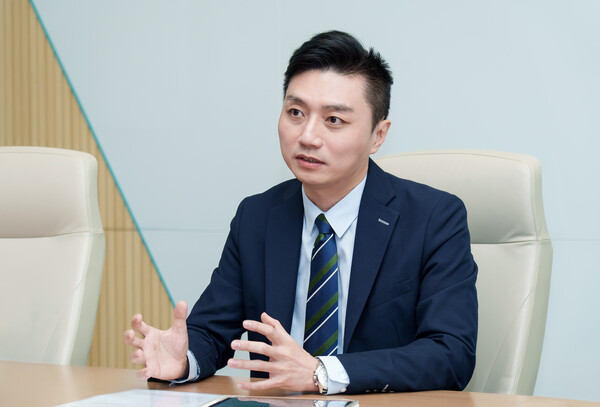Bayer, a prominent player in the pharmaceutical industry, is establishing itself as a trailblazer in radiology, as shown by its commitment and strategic moves aimed at driving innovation in medical imaging.
With a robust performance, generating close to 2 billion euros ($2.1 billion) in sales from radiology products in 2022, the company is not resting on its laurels. Instead, Bayer aims to surpass the average annual market growth rate of 5 percent by 2030 through vigorous research and development efforts.
These initiatives include the development of advanced compounds like gadoquatrane, a novel MRI contrast agent, and the integration of cutting-edge artificial intelligence (AI) into radiology.

While Bayer's global radiology presence continues to grow, Korea Biomedical Review met with TJ Chen, the Country Group Head of Radiology North Asia at Bayer, to gain extensive insight into the operational strategies and market challenges faced in Bayer's North Asian radiology sector, especially in Korea.
Chen, who has more than 15 years of experience in the pharmaceutical sector, decided to head a radiology unit after contemplating his next step, which led him to believe that medical devices will have a great impact on patients.
"My interest in the Bayer Radiology division stems from the fact that they have a full portfolio of both contrast media and injectors," Chen said. "Handling contrast media, which is related to the pharmaceutical portfolio, I judged that it would be a good opportunity to venture into the medical device sector."
Chen stressed that as the field of radiology encompasses the entire range from diagnosis to treatment, he believes that his experience will aid in understanding what is necessary to provide better outcomes for doctors and patients in the radiology sector.
"The radiology sector's challenge is considerable, grappling with the vast amount of data and the high patient numbers requiring prompt and accurate interpretation, which adds considerable workload and stress on healthcare professionals," Chen said. "Of course, the pharmaceutical field also faces similar problems, but the radiology sector has more options available, such as medical devices or AI, to overcome these situations."
As Bayer is on this journey together, the company is trying to find solutions for these challenges, Chen added.
Delving into the specifics of managing operations across different countries, Chen provided a nuanced understanding of the various markets under his purview – Korea, Taiwan, and Hong Kong.
"Taiwan and Korea share a very similar health insurance reimbursement system, almost akin to friends who take cues from each other's policies," he said. "Hong Kong is somewhat different, but it is similar in the aspect that it has a single-payer system market."
Chen also stressed that the fact that there are many similarities in cultural aspects among these countries helps him understand the team better.
While highlighting these similarities, Chen also pointed out the unique aspects of the Korean market, where competition in the contrast media sector is exceptionally fierce, arguably the most intense globally.
"The presence of local firms and the competitiveness of generic companies make Korea a challenging yet opportune market," he said. "Therefore, Bayer is approaching the market while contemplating how it can change the dynamics of the market, what the customers currently need, how to satisfy their needs, and how to better support them."
When asked about Bayer's edge over other competitors in Korea, Chen proudly explained Bayer Korea Radiology's comprehensive and integrated portfolio, which stands out as a notable strength in the market.
"Not many companies can truly say they offer a total solution, but we do," he said. "Our portfolio, including contrast agents, injectors, and AI solutions, positions us uniquely as a 'Total Solution Provider'," Chen noted. "This approach not only provides high-quality diagnostics to patients but also works towards easing the significant workload for healthcare providers."
Reflecting on the Korean division's recent achievements, Chen shared, "We've had quite a successful year. Both Ultravist and Gadovist have shown double-digit growth, and with the successful launch of the MEDRAD Centargo injector system, we've made substantial strides towards our vision encapsulated in our slogan 'Do Less, Care More'."
As for the future, Chen spoke of the company's goal to further expand its portfolio of radiology solutions in Korea, with a keen focus on operational efficiency and enhanced patient care.

"The integration of AI has been pivotal, and Bayer has shown strong commitment toward this area with the acquisition of Blackford Analysis," he said. "We're working closely to foster business growth in AI on a global scale and quickly introduce these solutions to the Korean market."
During the interview, Chen also touched on the silver linings that the Covid-19 pandemic brought to the field of radiology, notably in the acceleration of digital solution development and data-sharing practices.
"Covid-19 has certainly increased the workload, but it has also smoothed the path for data sharing, which is a significant step forward," he noted. "The pandemic has catalyzed a shift towards more collaborative and integrated healthcare, especially in the utilization of AI."
Chen stressed that such development is best portrayed in Korea.
"During discussions with Korean healthcare professionals about AI, I have come to understand that they have a very flexible mindset," Chen said. "They have many ideas for improving the environment and show great interest in data generation and related aspects."
Korean radiologists and medical staff are actively researching the generation of data using AI, as well as the application of AI to already generated data, he added.
Chen stressed that it wouldn't be an exaggeration to say that Korea is a global leader in this field.
As a result, Chen shared that Bayer is actively engaging with Korean AI and software companies, recognizing the country's competitive edge in the technology sector.
"We see tremendous potential in the Korean market, not just for local collaboration but also for contributions to our global solution development," he highlighted.
Bayer differentiating its solutions in the competitive medical device market
While Bayer may have a full radiology portfolio of both contrast media and injectors, some have questioned Bayer's position in the market due to the company's absence of medical devices that take up a considerable portion of the medical device market.
However, Chen stressed that Bayer tries to offer a meaningful difference in the day-to-day lives of healthcare providers and their patients by providing a solution that can untie all these devices into one platform.
"Indeed, many companies own portfolios with medical devices like scanners and offer corresponding software systems for operational synergy," he said. "However, radiologists have significant workloads, with some statistics indicating only five to 10 seconds to interpret an image, and operating various scanners and programs individually may not be efficient in such a busy context."
Bayer is pursuing a direction where a single platform can provide seamless access to all programs, and the company is seeing positive feedback to its integrated Bayer AI solutions in medical settings across the U.S., Australia, and Japan, he added.
Chen stressed that his team is diligently working to introduce these advancements rapidly in Korea as well.
"The distinction comes from our commitment to efficiency and integration," he said. "Unlike companies that just append free software to their medical devices, Bayer is focused on creating a cohesive, user-friendly platform that addresses the high-pressure demands of radiologists."
Chen concluded by sharing his management philosophy, which emphasizes the importance of integration, entrepreneurship, and transparency within the company. "These principles are vital in fostering a collaborative environment that thrives on innovation and delivers solutions that meet our high standards of care," he asserted. "Bayer's radiology division in Korea has been operating for over 30 years, and many team members have been with the division since its inception."
Despite this long history, Chen stressed it is very encouraging that many team members are still passionately deliberating on how to best serve customers and patients and that he believes that these efforts are the foundation of innovative ideas.
Related articles
- Bayer Korea names 1st Korean CEO
- [KBR Exclusive: Inside Boston Biocluster] Bayer spearheads cell and gene therapy advancement, shaping healthcare’s future
- [KBR Exclusive: Inside Boston Biocluster] Bayer pioneers precision molecular oncology for cancer breakthroughs
- Bayer Korea charts new course under 1st Korean leader Lee Jin-a

